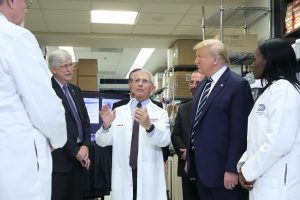There are risks, but also advantages, to sitting at the center of the intensifying geopolitical tug-of-war between China and the United States. As the world strides forward in the search for an effective coronavirus vaccine, Southeast Asia is set to become the focus of outside powers eager to win the region’s support and neutralize China’s own efforts to claim the mantle of global public health leadership.
In the new game of “vaccine diplomacy,” in Southeast Asia and further afield, much of the early movements have been made by Beijing. Extending its earlier campaign of “mask diplomacy,” which saw it shower its Southeast Asian neighbors with masks and personal protective equipment to combat COVID-19, China and some of its top drug-makers have begun assuring the region of access to a successful Chinese vaccine.
On August 24, Premier Li Keqiang promised the lower Mekong countries — Vietnam, Cambodia, Laos, Thailand, and Myanmar — priority access to vaccines produced by Chinese companies. The following day, state-owned drug maker Sinovac announced that it had partnered with Indonesia’s PT Bio Farma to develop the distribution of a vaccine that is currently undergoing trials in the country. The Philippines has also been offered early access to a Chinese vaccine, and Malaysia is currently in negotiations for a similar arrangement.
Despite the recent assurances by Chinese Foreign Minister Wang Yi that any COVID-19 vaccines produced in China will be made available as “global public goods,” there are reasons for Southeast Asian governments to tread cautiously. Reports have suggested that Beijing could use the promise of access to extract concessions on important issues, from China’s controversial damming of the upper reaches of the Mekong River to its extensive maritime and territorial claims in the South China Sea.
Yet if the region is wary and agile in its approach to Chinese offers, it stands to benefit from the intense competition that Beijing’s campaign of “vaccine diplomacy” is likely to prompt. One sign of this emerged late last month, when the Australian government announced a $58 million injection into the GAVI international vaccine alliance, which helps coordinate the COVAX scheme designed to secure rapid and fair global access to COVID-19 vaccines.
Specifically, Canberra’s down payment was intended to ensure access to vaccines for Indonesia, Cambodia, Laos, Myanmar, the Philippines, Timor Leste, and Vietnam, in addition to eight Pacific Island nations. Coming a few days after Prime Minister Scott Morrison vowed to help the nation’s “Pacific family” get access to a proven vaccine, the Australian commitment should be seen in the context of its growing consternation about China’s inroads in Southeast Asia and the Pacific.
Russia also recently approved the limited distribution of a COVID-19 vaccine, trollishly dubbed Sputnik V, after the Soviet satellite that beat the United States into orbit in 1957. Vietnam, which is also in the early stages of developing its own vaccine, has already committed to purchase up to 150 million doses of Sputnik V. Philippine President Rodrigo Duterte also offered to have himself injected with the new Russian vaccine, despite the widespread skepticism about its safety and efficacy.
Despite all of its concerns about China’s growing clout in Southeast Asia, the United States has been slower off the mark. Last month, Duke University and the American pharmaceutical company Arcturus announced a partnership with Singapore to develop another vaccine (known as Lunar-Cov19), which is currently in its first phase of clinical trials. Another U.S. company developing a vaccine, Novavax, announced a deal in early August to partner with the Serum Institute of India. In general, however, the Trump administration has taken an “America First” approach to the COVID-19 vaccine question, while spurning multilateral forums like the World Health Organization that are trying to coordinate global access and distribution. Even as research labs based in the U.S. press forward with vaccine trials, Washington has turned its back on the global coalition fighting the disease.
Still, there is plenty of time for the U.S. to reverse course. As a recent commentary from the Washington-based Center for Strategic and International Studies pointed out, after a slow start in the provision of pandemic-related support to Southeast Asia, Washington quickly caught up with Beijing’s efforts. In June, Washington quadrupled its COVID-19 funding commitment to Southeast Asia from $18 million to $77 million, making it the largest individual donor country to the region, at least in terms of monetary value. All this suggests that the U.S., where pharmaceutical companies are currently trialing a number of potential vaccines, will eventually emerge as an important partner of Southeast Asian countries in their quest to secure access to the life-saving jabs.
As the world’s researchers close in on a lasting inoculation against the novel coronavirus, the Southeast Asian countries will likely come under pressure from China, the U.S., and other governments to “pick a side” in the game of competing vaccines. But they are also in a position to play these powers off against one another, thus spreading their risk and ensuring access to effective vaccines when they finally emerge. “Vaccine diplomacy” is a reminder that while geopolitical tensions carry undeniable risks for Southeast Asia, they also bring opportunities — if the region’s governments are canny enough to seize them.

































